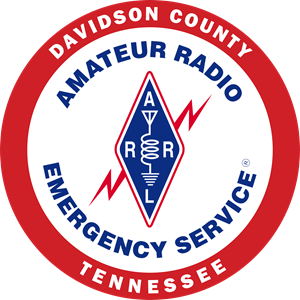BECOME A MEMBER
To be considered for membership in DCARES, please complete this Membership Application
MEMBER REQUIREMENTS
The following requirements have been set for DCARES membership:
- Live or work in Davidson County, Tennessee. (Exceptions can be made on a case by case basis.)
- Each member must check in to a minimum of THREE RF nets per quarter
- Each member must participate in ONE DCARES event (monthly meetings do not count toward requirement) or ONE sanctioned non-DCARES event yearly.
- Membership is yearly (January – December) and must be renewed each year by the member with approval from the Emergency Coordinator.
Examples of Events that meet Criteria:
- DCARES Workshop
- Field Day
- Jack and Back Bike Ride
- Skymont Horseback Ride
- Bike MS Bike Ride
- Gravel Revival Bike Ride
- DCARES antenna crew (tower raising, tower disassembly)
Other Qualifying Non-DCARES Events:
- TEMA Auxcom Event
- NWS Severe Weather Awareness Day
- NWS Spotter classes
- Other DCARES training events that will be scheduled and identified
- FEMA ICS online Classes (not just 100, 200, 700, 800)
- FEMA Classroom Training
- American Red Cross (ARC) Training
- Members can request that events be considered for inclusion
DCARES AUXCOMM PROGRAM
The Davidson County Amateur Radio Emergency Services (DCARES) Auxiliary Communications (AuxComm) program has been developed to provide training and organization for DCARES volunteers who are interested in enhancing their radio ability with knowledge, skills and hands-on experiences specific to the world of AuxComm. “AuxComm” is a term used to refer to the Auxiliary Emergency Communications role within the Incident Command System (ICS) that is used during emergency situations like the 2010 Nashville flood to manage the incident.
While all ARES members are expected to participate in emergency communication, the DCARES AuxComm program is designed to provide a more structured approach to prepare communication specialists who can provide leadership for AuxComm deployments.
The goals of the DCARES AuxComm program are:
- Provide specialized training in emergency communication and field operation.
- Promote incremental improvement in volunteer training and proficiency by establishing achievement levels within the program.
- Prepare leaders who can organize and supervise other operators during emergencies.
- Encourage training and practice with the Incident Command System (ICS).
- Develop relationships with served agencies.
- Coordinate with ARES groups in surrounding counties.
- Organize and carry out AuxComm emergency preparedness exercises.
- Recruit and mentor new DCARES members who have an interest in AuxComm.
There are four levels of AuxComm participation that have been developed within DCARES, as follows:
Level 1 – Radio Operator I
As a Radio Operator I would serve as an assistant to a Radio Operator II and a Level 3 team leaders. Duties include equipment set-up and take-down, logging of calls and other tasks as needed. This level allows newer amateurs the opportunity to observe and learn emergency communication operations. In certain cases, a Radio Operator I could be deployed to the field.
Radio Operator I requirements:
- Minimum of Technician level ham license
- Proficiency with a VHF/UHF HT radio.
- Proficiency with ITU phonetic alphabet
- If deployed, can stay in the field for a minimum of 24 hours with supplies such as food, water, meds, battery backup for radios, etc.
OPTIONAL Items:
- Completion of ICS 100, 700, 200 and 800 courses
- proficiency with a VHF/UHF or HF base station.
- Completion of SKYWARN training.
Level 2 – Radio Operator II
A Radio Operator II would receive and transmit information as needed to assist the served agency via UHF/VHF and HF. A Radio Operator II would also assist the team leader as needed and mentor Radio Operator I team members.
Radio Operator II requirements:
- Level 1 requirements plus:
- General class amateur license
- Completion of SKYWARN training.
- Proficiency with a UHF/VHF/HF base station
- Completion of ICS 100, 700, 200 and 800 courses
- Winlink training and demonstrated knowledge of setup, operation and break-down of drop kits.
- Demonstrated knowledge of safe field setup and operation using portable power systems.
Level 3 – Team leader
Level 3 is the first supervisory level within DCARES AuxComm program. Team Leaders supervise field teams, develop schedules for radio coverage, monitor on-site safety and serve as on-site liaison with the served agency. Level 3 operators are expected to be familiar the Incident Command System (ICS) and be able to apply ICS organization to incident responses. Level 3 volunteers supervise and mentor Level 1 and Level 2 volunteers.
Level 3 requirements:
- Level 2 requirements plus:
- Completion of ICS-300 training
- MTEARS knowledge and experience.
- Attend site visits to served agencies (during field operations), National Weather Service station and American Red Cross.
- Demonstrated proficiency with voice and Winlink radio operation
- Ability to assess and monitor safety of field operation.
- Net control introductory training.
- Demonstrated leadership ability such as participation in training events as an instructor/leader
Level 4 – AuxComm Coordinator
Level 4 volunteers report directly to the DCARES Emergency Coordinator (EC) and act in the place of the EC when needed. Level 4 volunteers assign and supervise multiple Level 3 team leaders in the event of large incidents, and they verify that staffing resources, equipment and food/lodging is available at deployment sites as needed. Level 4 volunteers coordinate with served agencies, Incident Command, TEMA, FEMA and other government agencies as needed. Level 4 volunteers mentor Level 3.
Level 4 requirements:
- Level 3 requirements plus
- Completion of COML class
- Recommendation of DCARES Emergency Coordinator
- Ability to assess team member performance and recommend team leaders
Additional recommended training
The following training opportunities are optional but recommended.
- CERT
- American Red Cross: First Aid/CPR
- Additional ICS training courses such as ICS-400
- DCARES/county/regional/ training exercises and events
